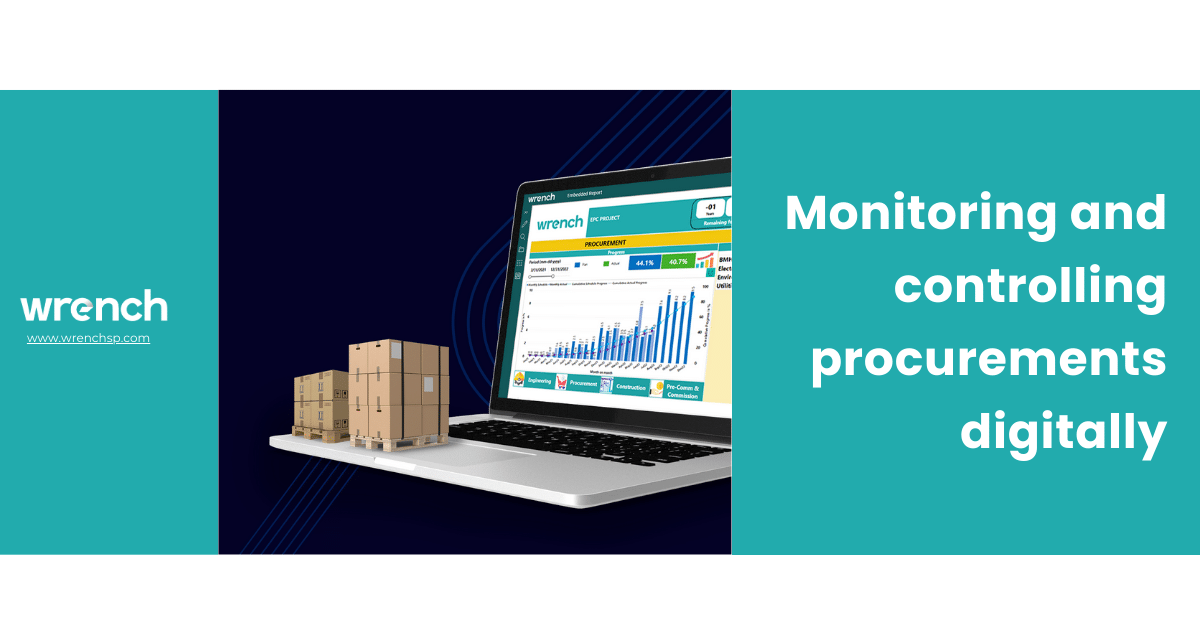- Blog EPC projects Procurement Management
- 05 Mar 2024
Monitoring and Controlling Procurements Digitally

The value of procured items in EPC (Engineering, Procurement, and Construction) projects can vary depending on project specifics, but typically, it ranges from 60% to 80% of the total project cost. Getting these procured items on or before the construction required date (CRD) within the right cost and time is critical to project success. The sheer volume of work and the number of stakeholders involved makes it complex. Trying to manage them manually is difficult and complex. This article shares how companies manage the procurement component of their projects, both pre-contract and post-contract digitally.
Work involved in both Pre-order and Post-order stages of EPC Projects
| Pre – Order | Post – Order |
| Scope definition | Supplier management |
| Market research | Quality assurance and control |
| Pre-qualification of suppliers | Material expediting |
| Request for Information (RFI) | Change management |
| Request for Proposal (RFP) | Invoicing and payment processing |
| Bid evaluation | Documentation and record keeping |
| Negotiation | Risk management |
| Contract formation | Claims management |
| Risk assessment | Project closeout |
| Legal and regulatory compliance | Lessons learned |
These activities, replicated for all high value / long lead items will give you an idea of the amount of work involved in procurement within EPC projects.
Collaborative Nature of Work
Another aspect of procurements which makes it time consuming is the sheer number of stakeholders involved. This calls for a high degree of collaboration among;
- Owners
- Project Management Consultants (PMC)
- Contractors
- Engineering team
- Procurement team
- Construction team
- Suppliers and vendors
- Project management team
- Regulatory authorities
- Finance department
- Quality assurance and control teams etc
Security Aspects
Procurement involve high degree of communication among stakeholders, and many of these stakeholders are external to the organisation. Wherever bidding process is involved, confidentiality hence security of information, is of paramount importance.
Contract Adherence
The most challenging and time consuming post-order activity in procurements is ensuring the adherence to contractual terms and conditions. Before issuing any payments, one has to ensure that all contractual conditions are met.
While most of these comes under the gamut of procurements, projects get heavily impacted when there are slippages and cost overruns.
Monitoring & Controlling Procurement Progress
Projects are effectively using the concepts of Earned Value Management (EVM) for monitoring and controlling procurement activities.
- Procurement schedule preparation
- Defining the rules of credit
- Measuring procurement progress using earned value management
- Planned Value (PV) – As per the schedule how much procurement work are we supposed to complete
- Earned Value (EV) – How much work did we complete
- Procurement Schedule Variance = EV-PV
- Procurement schedule performance index (SPI) = EV/PV
If project teams can regularly monitor the procurement schedule variance on a regular basis and take corrective and preventive actions on time, procurement delays and the associated project delays can be effectively controlled.
Monitoring & Controlling Digitally
The biggest challenge of monitoring and controlling procurement activities is to get the correct progress information on time. Delays in reporting and inaccuracy erode the effective monitoring and control of the procurement progress. This can be addressed only by digitalising the procurement work flows, both pre-order and post-order. Here are the steps involved;
- Digitalise the procurement workflows
- Define the rules of credit (indication of progress)
- Monitor and control procurement progress realtime digitally using digital dashboards
In conclusion, the digitalization of procurement workflows offers significant advantages in monitoring and controlling procurement activities within EPC projects. By leveraging digital technologies, organizations can streamline procurement processes, enhance transparency, and accuracy. Real-time visibility into procurement progress allows project teams to identify potential bottlenecks, mitigate risks, and optimize resource allocation. Moreover, digitalization enables better collaboration among stakeholders, facilitates compliance with regulatory requirements, and reduces administrative burdens associated with manual procurement tasks.
Expert in agile, predictive and hybrid project management. Researches on the application of Artificial Intelligence for better project outcomes. Works as a domain expert at Wrench Academy, the knowledge management division of Wrench Solutions, the makers of Smart Project Digital PMO.
Related Posts

EDMS Features and Functions
When an EPC organisation, be it an owner, architect, contractor, or consultant, starts on a journey of digital transformation the first step is likely an EDMS or engineering document management system. The expectation is that…
- 10 Apr 2025

Engineering DMS vs Electronic DMS
The term EDMS has become commonplace in engineering-related sectors these days, especially in EPC project verticals where the management of technical documentation is a key factor in successful project delivery. It must be noted that…
- 04 Apr 2025
Archives
- April 2025
- March 2025
- February 2025
- January 2025
- November 2024
- October 2024
- September 2024
- August 2024
- July 2024
- June 2024
- May 2024
- April 2024
- March 2024
- January 2024
- December 2023
- November 2023
- September 2023
- August 2023
- July 2023
- June 2023
- May 2023
- April 2023
- March 2023
- February 2023
- January 2023
- December 2022
- November 2022
- September 2022
- June 2022
- May 2022
- April 2022
- March 2022
- January 2022
- November 2021
- October 2021
- July 2021
- June 2021
- May 2021
- March 2021
- February 2021
- January 2021
- December 2020
- November 2020
- September 2020
- August 2020
- June 2020
- April 2020
- March 2020
- February 2020
- January 2020
- November 2019
- October 2019
- September 2019
- August 2019
- April 2019
- March 2019
- December 2018
- October 2018
- September 2018
- August 2018
- July 2018
- June 2018
- May 2018
- April 2018
- January 2018
- November 2017
- October 2017
- September 2017
- May 2017
- April 2017
- March 2017
- February 2017
- January 2017
